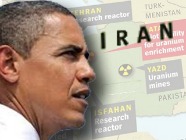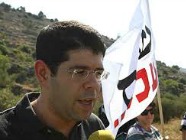
Israel-Palestine pundits often seem to compete over who will be more skeptical, if not dismissive, of new diplomatic initiatives. Given past peace-making failures, they know that predictions of failure are their best bets.

Israel-Palestine pundits often seem to compete over who will be more skeptical, if not dismissive, of new diplomatic initiatives. Given past peace-making failures, they know that predictions of failure are their best bets.

Stephen Walt and John Mearsheimer got it wrong when they laid blame for the Iraq War on the "Israel Lobby" (in their book, The Israel Lobby and U.S. Foreign Policy). However, a war with Iran could be a different story. As I warned back in March 2012, a much clearer line can be drawn between the efforts of U.S. Jewish groups and hawkish Iran policies. "For more than a decade," I wrote, "the same forces that Walt and Mearsheimer erroneously blamed for America's Iraq debacle have openly led efforts to convince Washington and the American people that war with Iran is necessary and inevitable."

Security for Settlers, Not the State of Israel
Analysis by Peace Now's Director General, Yariv Oppenheimer
Last week, Dov Weisglass - former top advisor to Prime Minister Ariel Sharon - wrote in Yedioth Ahronoth (Hebrew edition) about the Israeli security needs and the Jordan Valley. His article, translated by Israel News Today (INT), is required reading for anyone following this issue and how it is being exploited today in efforts to block progress toward an Israeli-Palestinian peace agreement.

For years, Israel and the American Jewish community have been sounding the alarm over Iran's nuclear program. This alarm is wholly justified, given the Iranian regime's record in the nuclear arena, the views and behavior of many of its officials over the years, and its support of international terrorism.

We Israelis often complain that 'there is no one to talk to.' But for many young Palestinians, Israelis are a lost cause - and anti-normalization means there is less interaction than ever to prove this wrong.
By Ori Nir
I recently met with a group of about a dozen young reporters and photojournalists from the West Bank. I asked them whether they had any contacts with Israeli journalists and was shocked to hear they did not. I told them that when I covered Palestinian affairs for Haaretz in the 1980s and '90s, Palestinian journalists were my primary sources - and my good friends. Back then, journalists on both sides of the Israeli-Palestinian divide sought contact with each other, first and foremost because they thought their readers needed and wanted to know about their neighbors.
An article by Shaul Amsterdamski in today's edition of the Calcalist - an Israeli business daily linked to Yedioth Ahronoth - reports on a remarkable phenomenon: the variety of "loans" made by the Israeli government to settlements and individual Israeli settlers, either with a formal or informal understanding that part, most, or even all of the loan would never be repaid.
The original article (in Hebrew) is available here. Includes here is a portion of the article, as translated into English by Israel News Today.

Since the birth of the peace process, popular wisdom has held that an Israeli leader cannot be expected to expend much domestic political capital during talks, because political capital must be saved to "sell" any agreement at the end of talks. In principle, there is some logic in this argument. In practice, that logic is now hitting a brick wall. If recent events indicate the patterns of action to come, talks will be in danger of falling apart long before an agreement is in reach.

By Rob Eshman
Last Monday night after dinner, after the dishes were cleared, I sat in my dining room with Mark Rosenblum and asked him the question I'd long been meaning to ask: Why don't you just give up?

Israeli and Palestinian negotiators are preparing to resume their peace talks Wednesday in Jerusalem. Complex issues lie before them, according to Lara Friedman Director of Policy and Government Relations for Americans for Peace Now. She spoke with VOA's Susan Yackee on August 14, 2013.
Listen here